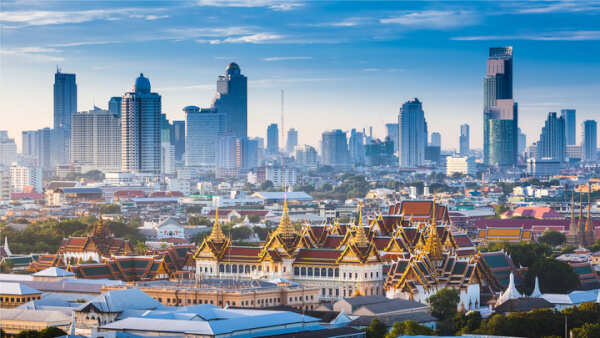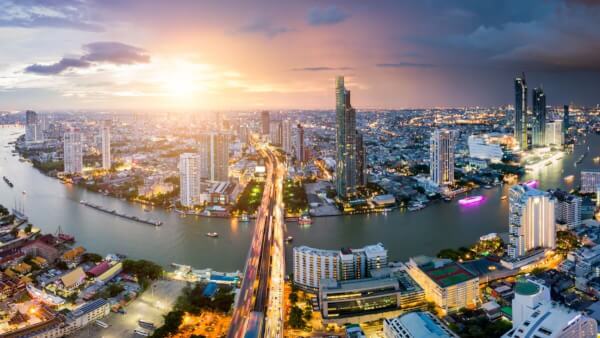Expat tax in Thailand: What you need to know as a UK expat
Read our helpful guide to expat taxes in Thailand, including info on how British expats are taxed in Thailand and current personal income tax rates.

Thailand attracts many UK expats with its affordable lifestyle and abundant sunshine. Whether you’re starting a new chapter, working remotely or settling into retirement, it’s a place where you can easily feel at home.
In this guide, we’ll explore what it’s like living in Thailand as an expat. We’ll look at healthcare, job opportunities, the cost of living and more.
We’ll also point out a cost-effective way to manage your money across borders from the money services provider Wise – the Wise account. It’s not a bank account but offers some similar features, and your money is safeguarded.
Over 14.8 million people worldwide use Wise to send, spend and convert money in 40+ currencies – for low, transparent fees* and no-markup exchange rates close to what you can see on Google. Plus, you’ll get dedicated support and volume discounts when sending large amounts.
Learn more about the Wise account ➡️
| Table of contents |
|---|
Let’s go through some quick facts about Thailand:
| Currency | Thai baht (THB) |
|---|---|
| Main language | Thai |
| Population | 71,606,800¹ |
| Number of British expats | around 41,000² |
| Popular expat destinations | Bangkok, Phuket, Chiang Mai |
Living expenses in Thailand are significantly lower than in the UK. From food and housing to utilities, day-to-day costs are much more affordable.³
Here’s an overview of the typical average costs you can expect in Thailand compared to the UK:
Finding a job as an expat in Thailand can be challenging. Some smaller companies may be reluctant to assist with the necessary documentation or sponsor a visa and a work permit. Additionally, Thai labour laws restrict foreigners from working in certain jobs, such as manual work, beauty treatments or guided tours.⁴
For this reason, many expats find jobs through international companies and relocate to Thailand via internal transfers, which often makes the visa and permit process easier. These companies also usually don’t require Thai language skills, since English is the main language used at work.⁴
Some commonly used platforms for job hunting in Thailand include:
Thailand offers various career opportunities for expats, particularly in sectors like education, real estate, IT and management.⁴
There are two visa types suitable for expats moving to Thailand. One is the Non-immigrant visa, which is made for people coming to Thailand to work, study, retire or stay long-term for other purposes. This is the most commonly used visa among expats and it covers a range of situations.⁵
The other option is the SMART visa, designed for highly skilled workers or investors. It targets people who want to work or invest in certain industries in Thailand. This includes sectors such as agriculture, robotics, aviation and tourism.⁵
| 📚 Read more: Digital Nomad Visa in Thailand - What it is, the cost and how to get it |
|---|
There are twelve types of Non-Immigrant visas, each designed for different professions or reasons for staying in Thailand. The options include:
Each visa type requires various additional documents. For example, if you’re applying for a B category visa to work as a teacher, you’ll need academic certificates, a letter from the school or university confirming your job and an approval letter from the Ministry of Education. After arriving in Thailand, your school will help you get a teaching licence and a work permit.⁶
The SMART visa was introduced to attract talent and investors who can contribute to knowledge growth and enhance Thailand’s position in the global economy. This visa is valid up to four years and it allows expats to live and work in Thailand without needing a work permit.⁷
The following categories of applicants and their dependents are eligible to apply:
Each of these categories has additional requirements, including education and salary requirements. For example, executives must earn at least 200,000 THB and have 10 years of work experience.⁷
However, the SMART visa is only available for certain industries. This includes the following sectors:
Besides the main visa categories, Thailand recently introduced a visa aimed at wealthy global citizens, wealthy pensioners, remote workers and highly-skilled professionals. Each visa holder can also bring up to four dependents.⁸
The LTR visa has strict eligibility criteria, but it comes with a range of benefits. This includes a 10-year stay, lower personal income tax and fast-track services at airports.⁸
| 📚 Read more: Travel to Thailand from the UK: Must-know travel advice |
|---|
Thailand has strict property ownership laws which only allow Thai citizens to own land. However, foreigners are allowed to own apartment units in a building, which is one of the more popular options for expats living in Thailand.⁹
Aside from buying a condo, another option while living in Thailand as an expat is a long-term lease. This arrangement allows you to lease land for up to 90 years and own the home built on it.¹⁰
In some cases, expats may also qualify for a mortgage. Thai banks have become more open to lending to foreigners, especially if you’ve lived in the country for at least a year, hold permanent residency and are under 60.¹⁰
If you prefer renting, some of the most popular places for expats in Thailand include Bangkok, Chiang Mai and Phuket. Bangkok is the most expensive place for both living and renting, but it’s still far more affordable than the UK. Phuket is especially popular among retirees, while Chiang Mai offers a slower pace of life and great international schools.¹¹
Depending on who you’re renting from, the upfront costs can vary. If you’re renting from a commercial landlord, you’ll usually be asked to pay only one month of rent in advance and an equivalent amount in security deposit. In other cases, you may be asked to pay up to three months of rent upfront. When it comes to agency fees and commissions, the landlord is responsible for them in most cases.¹¹
To rent a house or apartment in Thailand, some of the most popular platforms include:
Thailand’s culture is based on respect and tradition, which is why family plays a very important role in everyday life. Extended families often live close together and support each other in different ways.¹²
Another key cultural concept is saving face, which means avoiding embarrassment, conflict or anger in public. Causing someone to lose respect or feel humiliated openly can damage relationships and lead to confrontation.¹²
This cultural focus on avoiding conflict means Thai people often stay calm and polite, even when upset. In reality, it’s a cultural way of maintaining respect and harmony. It’s important not to misinterpret this as a lack of seriousness or to take advantage of it.¹²
One of the most important aspects of both Thai culture and law is respect for the monarchy. Criticising or insulting the royal family is a serious offence and can lead to severe legal consequences, even if you’re just sharing articles or making casual political comments. If you’re living in Thailand as an expat, it’s important to avoid any remarks or actions that could be seen as offensive towards the monarchy.¹³
Thailand’s healthcare system is generally good and affordable. As a foreigner, you’ll have access to free public healthcare, but private care is more popular with expats.¹⁴
The national health insurance system is called the Universal Coverage Scheme or UCS. While the country has many great doctors, public hospitals often have long waiting times. On the other hand, private hospitals usually offer quicker service and have more English-speaking staff.¹⁴
Thailand’s education system has four main levels. The first level is early childhood education for children aged 3 to 5 years, followed by basic education, which lasts nine years and is compulsory for children aged 6 to 15. Basic education is divided into six years of primary school and three years of lower secondary school.¹⁵
After basic education, students can continue with upper secondary education, which lasts three years but is not compulsory. Upon completion, students may choose to enter vocational education or higher education at universities and colleges.¹⁵
The English Programme is a government initiative offered by some public and private schools in Thailand. In this programme, almost all subjects are taught in English. Although these classes aren’t free even in public schools, they tend to be cheaper than international schools.¹⁶
International schools follow Western curricula, making it easier for expat children to adapt. There are many international schools in cities like Bangkok and Pattaya, but some of them have long waiting lists.¹⁶
Thailand has a lot to offer expats, but it’s important to consider both the good and bad sides. Here are some of the key pros and cons of living in Thailand as an expat.
Pros:
Cons:
| 📚 Read more: How to open a bank account in Thailand |
|---|
Sources used:
Sources last checked on date: 08-Oct-2025
*Please see terms of use and product availability for your region or visit Wise fees and pricing for the most up to date pricing and fee information.
This publication is provided for general information purposes and does not constitute legal, tax or other professional advice from Wise Payments Limited or its subsidiaries and its affiliates, and it is not intended as a substitute for obtaining advice from a financial advisor or any other professional.
We make no representations, warranties or guarantees, whether expressed or implied, that the content in the publication is accurate, complete or up to date.

Read our helpful guide to expat taxes in Thailand, including info on how British expats are taxed in Thailand and current personal income tax rates.

Learn everything you need to know about expat health insurance for Thailand, from finding the best providers to accessing healthcare and managing costs.

Here's how to use Wise for Property Purchases and Long-Term Stay Visa Applications and Renewals in Thailand.

Read our guide on the risks of buying property in Thailand and avoid the most common mistakes.

Explore the pros and cons of living in Thailand in our guide. We’ll also discuss if Thailand is safe for expats and the best places to live in the country.

A list of the top banks in Thailand, including Bangkok Bank, Kasikorn Bank, Krungthai bank, Siam Commercial Bank and Krungsri Bank.